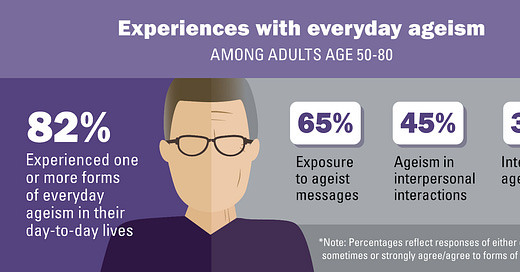Ageism: An Accepted form of Prejudice?
The reality of harm done by old-person jokes and media stereotypes
There are plenty of negative and harmful isms that need fixing. Among the lesser appreciated but widely acceptable forms of prejudice—and a harmful one at that—is ageism.
Sure, even I love a good “old man” joke. I’m 60, and I make them all the time, both in self-deprecating form and at the expense of good friends of a certain age. But should I?
Lisa Borrero, PhD, an associate professor of health and aging studies at the University of Indianapolis, doesn’t think so.
“The hashtag, #OKBoomer, became a cultural sensation as a humorous quip to sling at clueless older people,” Borrero writes in Psychology Today. “Criticism of the phrase, given its pervasive use to demean older adults, is largely dismissed as oversensitivity. Accordingly, ageism has been described as the last acceptable form of prejudice.”
I’m going to somewhat grudgingly agree with her on the potential harm in the OKBoomer hashtag—though given the broad economic advantages conferred to the generation over time, I think it deserves to have its balloon deflated a bit. But will I stop with the age-old old-age jokes myself? Probably not. Then again, as a very active “senior” (a word I’ve come to despise) I don’t feel as affected by cultural ageism as many people no doubt are.
Let’s look at the reality.
Older people are often portrayed in the media, and in the public consciousness, as frail, forgetful and incapable. An analysis of a billion entries in U.S. and British media databases found six times as many negative descriptions of older adults compared to positive ones. “Magazines contain the highest levels of ageism, followed by the spoken genre, newspapers, and fiction,” the study concluded.
The portrayals, along with deeply rooted cultural fears of aging, lead to a host of negative stereotypes, actions and reactions. Unfortunately, a lot of older people buy into the stereotypes. Older adults who spend more time watching TV, reading magazines or browsing the internet are more likely to report everyday ageism, according to the University of Michigan’s National Poll on Healthy Aging.
“Ageism refers to discrimination, prejudice, and stereotyping based on age,” researchers involved in the poll explain. “Age-based discrimination in employment, housing, and health care can negatively affect older adults’ health and well-being. Older adults may also experience ageism in their day-to-day lives through interpersonal interactions and exposure to ageist beliefs, assumptions, and stereotypes.”

“Negative stereotypes of aging mean older adults are less willing to seek help when they need it,” writes Najmeh Khalili-Mahani, a Concordia University researcher of the media’s effect on health. “Ageism and a lack of age-friendly communications alienate older adults from participating in research about their health. This makes them shy away from seeking care, or participating in research that can benefit them.”
I hope that’s not your experience. In fact, there’s much reason to be optimistic about getting older. While younger people tend to fear aging, older folks get pretty damn comfortable with it, reporting higher levels of happiness, on average, than people in midlife.

As you’ve probably gleaned by now, I put a lot of writing energy into helping you and others figure out how to age well, to give yourself the best chance of staying fit, sharp and capable. I’ve written about how anti-aging advice is harmful, the fact that aging is often thought of as a dirty word and wrongly considered by some researchers as a disease.
Yet I will admit that even I need to be careful how I convey the science and frame the motivation.
“By overemphasizing healthy aging, those who are unable to age successfully are implicitly stigmatized,” Khalili-Mahani writes.
Duly noted.
As you and I explore the science of growing healthier and happier in this newsletter, let’s embrace the inevitable—we will get older—and not buy into harmful aging stereotypes nor feed them by blindly ignoring the challenging realities of old age. But I still think we can make a little fun of ourselves now and then.
***
TOTALLY UNRELATED
Wouldn’t you love to have a four-day workweek? The idea is actually catching on, especially in Europe, but to a lesser extent in the United States. You might want to share this with your boss: Amid growing employee stress and burnout, pilot studies and other research show that the four-day workweek can boost worker health and morale and lift productivity and company profits. So why isn’t everyone doing it? In my latest article on Medium, I explain why it works, when it does not, and what businesses need to consider in giving it a try. Read the story >
FACT IS…
“Working too many hours causes physical and mental stress that killed 745,194 people before their time in a single year around the globe, due to heart disease and strokes,” the World Health Organization estimates.
JUST FYI
The lifetime odds of dying for the average American are 1 in 6 from heart disease, 1 in 7 from cancer. Bee stings? 1 in 46,562. How about being struck by lightning? 1 in 218,106.
BIT OF WISDOM
“We have to work on ourselves, and to fight the ideology that measures human life by what it’s able to achieve—a scale that condones grotesque inequalities of wealth and social standing.”
— Kieran Setiya, Life is Hard
***
Until next week, wishing you health and happiness.
—Rob
Thank you for your support. If you find this newsletter useful, go ahead and forward it to someone who might benefit. You can find more of my health and wellness writing on Medium. Also find me on YouTube, Instagram, Mastodon, Twitter, Linkedin. And if you want to live a long, healthy, happy life, check out my book, Make Sleep Your Superpower.



